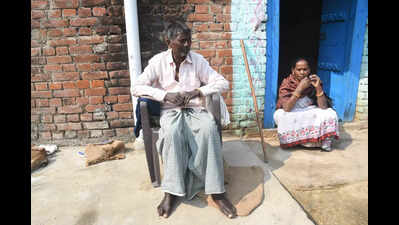ARTICLE AD BOX

Sikandar Choudhary, whose nine family members were allegedly massacred by members of the now-defunct Ranvir Sena on Dec 1, 1997
Lakhsmanpur Bathe (Arwal): The morning sun had barely touched the fields of Lakshmanpur Bathe when the first lines of voters began forming outside booth numbers 46, 47 and 48. The air carried the sounds of democracy – loudspeakers, chatter and the rhythmic shuffle of slippers on the dusty ground.
Yet, just 100 metres away, silence reigned.On a rickety chair outside his home sat 67-year-old Sikandar Choudhary, his gaze fixed somewhere far beyond the voting queues. His legs, twisted by arthritis, refused to move. But it was not only his body that had given up – his spirit had too. “Why should I vote? My wife and two daughters were killed, but I was not given a govt job,” he said bitterly.For Sikandar, the elections meant little. The memories of Dec 1, 1997 – the night when Lakshmanpur Bathe was drenched in blood – were still alive.
On that winter night, around 58 Dalit villagers were allegedly slaughtered by members of the now-defunct Ranvir Sena, a private militia of upper-caste landlords. Among them were nine members of Sikandar’s own family.“My father, mother, eldest brother, his wife, two nephews, my wife and my two daughters were butchered in the backyard of our house,” Sikandar said.“I helplessly and silently watched the carnage from the roof of our thatched house.
I recognised 3-4 killers and later became a witness in the court case. About 200-250 persons stormed our village that night. Groups of 10-15 killers entered separate houses and went on a killing spree.”Sikandar then paused, his cloudy eyes fixed on the ground. “I was given Rs 1 lakh by central govt and Rs 1 lakh by state govt for each death. I received total Rs 6 lakh for my wife and two daughters’ death. With money spent on household expenses and my treatment, I am in a miserable condition now,” he said.Sikandar, who belongs to the Mallah caste, once believed justice would heal the wounds. But the years only deepened them. “My two brothers were given govt jobs. Nine deaths in the family had made me mentally unstable, so I approached the authorities concerned late, but my application was rejected. I have filed a petition in this regard in Patna high court and the case is pending,” he said.Today, he lives with his second wife, four daughters and two sons.
Age and illness have left him helpless and the family struggles to survive.Next door lives Sunaina Devi, who carries her own burden of loss. Her husband, Vinod Paswan, lost seven family members that night. “My mother-in-law, four ‘devars’ and two ‘nanads’ were killed. I survived because I was at my mother’s house on that horrible night,” Sunaina said.She pointed towards the open ground near the Sone river. “A memorial was built for those killed in the incident at our courtyard.
It was shifted a year ago near the banks of the Sone river. Govt provided support to us, but after so many deaths, things could never become the same again in our family,” she said.Further down the village lane, 76-year-old Naga Baba still remembers every sound of that stormy night. “I survived because I hid in the ‘dalaan’ and they didn’t notice me. It was raining and the attack happened around 9pm,” he said.Not everyone in Lakshmanpur Bathe turned away from the polling booths, though.
Among the voters was Lakshman Rajvanshi, who exercised his franchise early in the morning. But his faith in the system is scarred by what he calls “justice denied.” “They killed 58 of us, including my wife, daughter and daughter-in-law. However, they were not punished. I had told local leaders clearly that I will not take money from them, but will not miss my right to vote,” Rajvanshi said.The Patna high court had acquitted all 26 accused in the 1997 Lakshmanpur Bathe massacre, overturning the convictions given by a lower court. The Supreme Court never delivered its final verdict as all the accused died while the appeal was still pending.

 1 hour ago
5
1 hour ago
5








 English (US) ·
English (US) ·